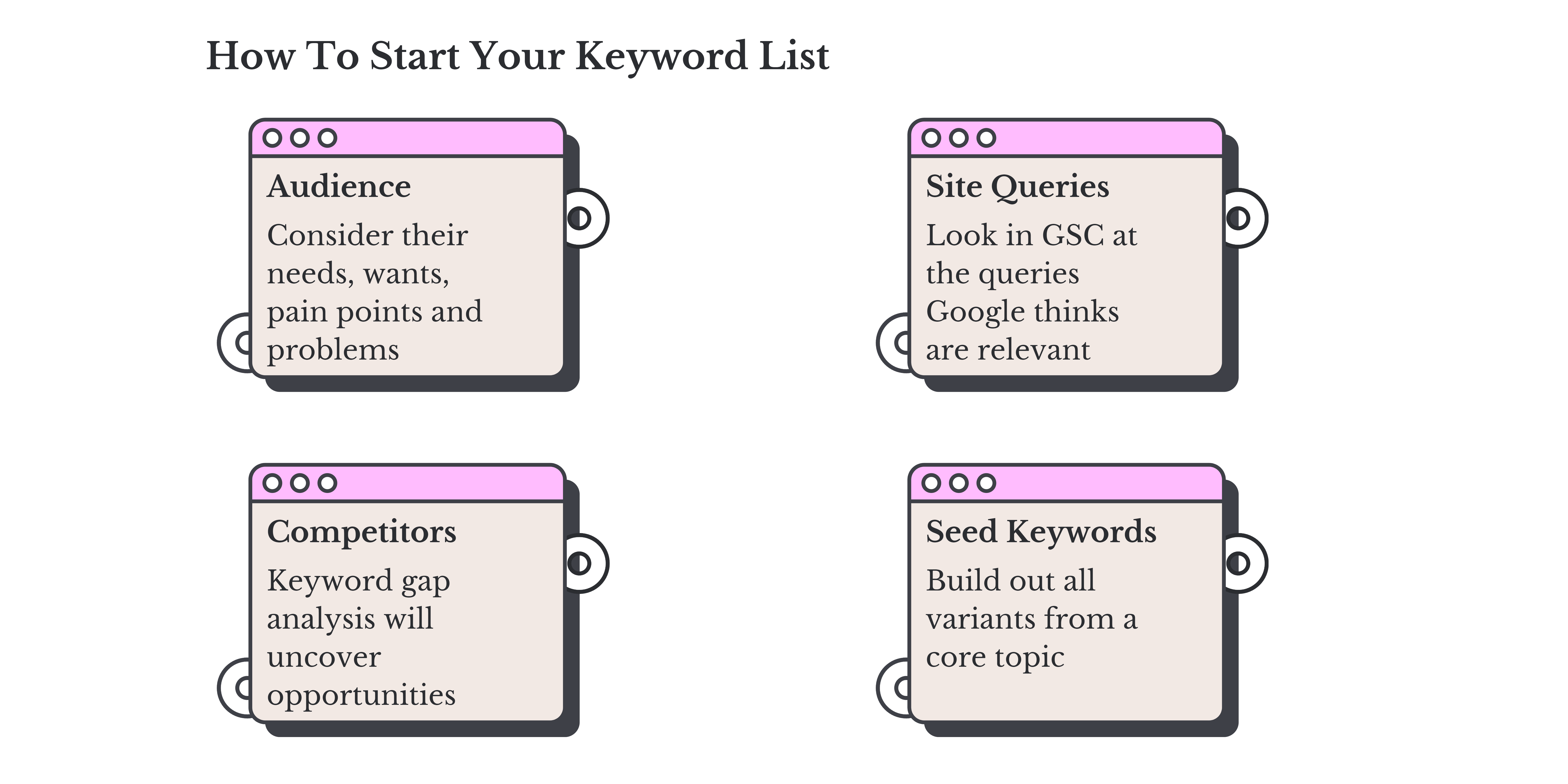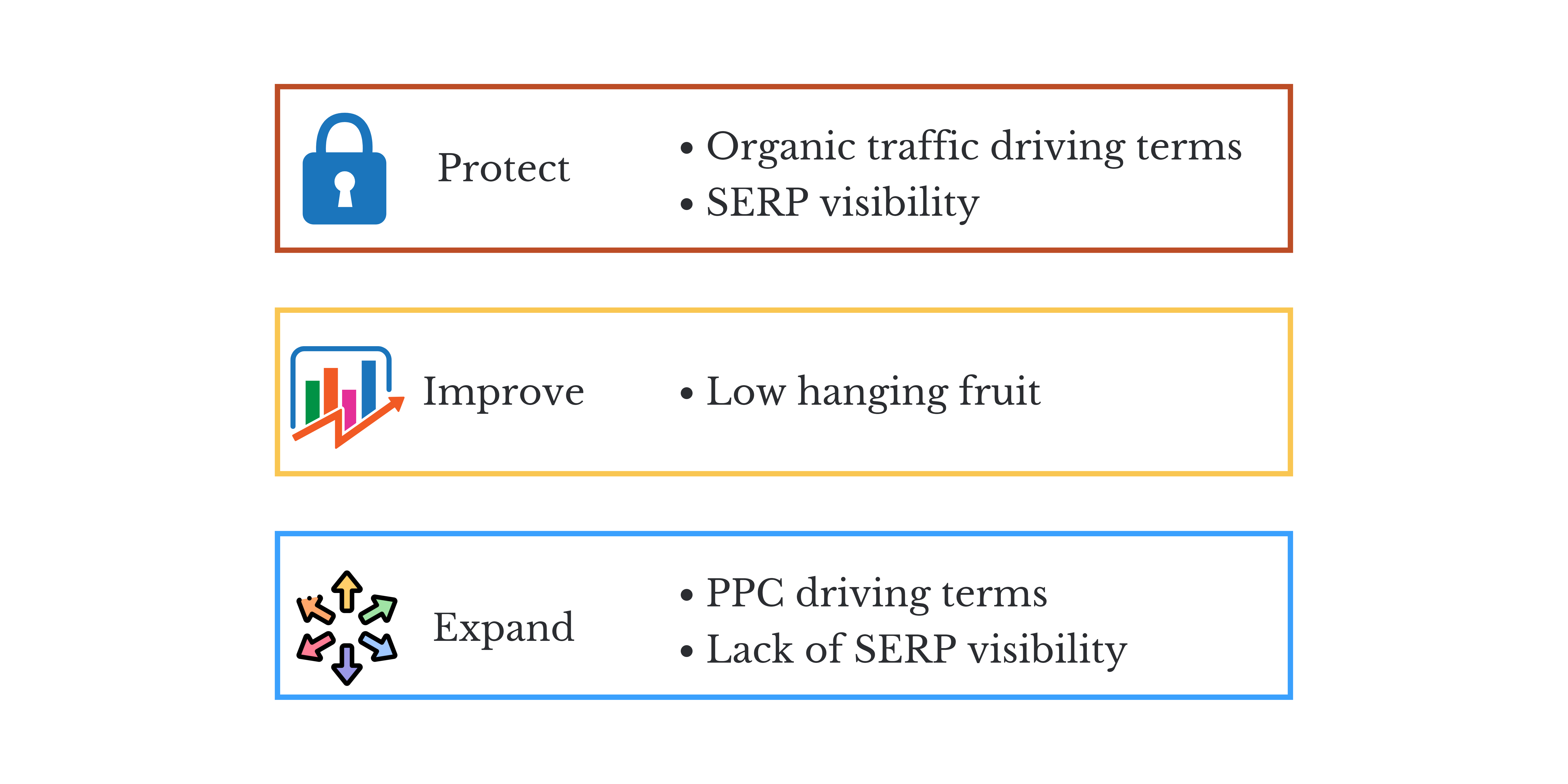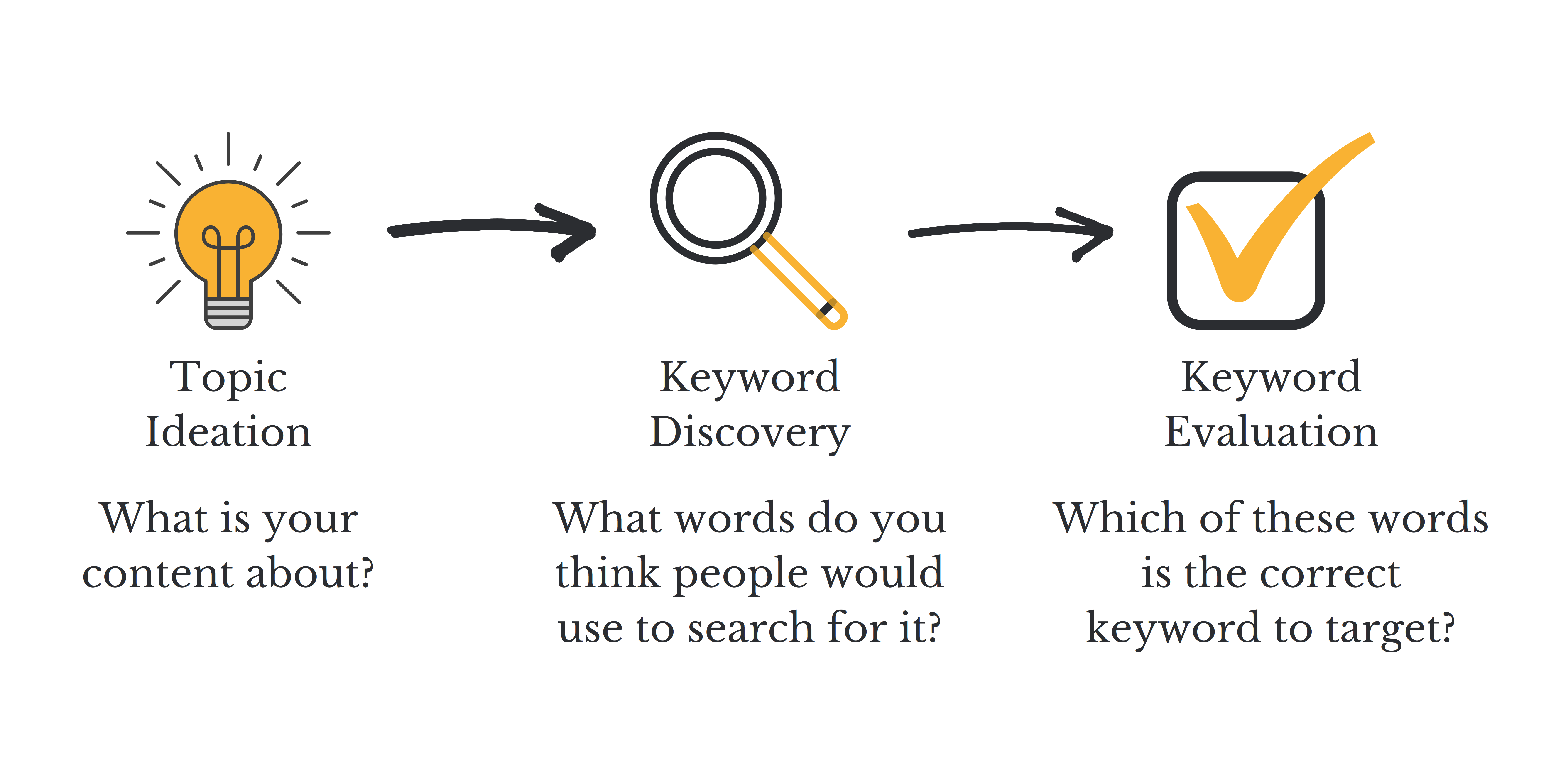Keyword Research the foundation of Search Engine Organization, and without it, you cannot expect to create sustainable and repeatable visibility.
Today, SEO is a much wider discipline than in the early days of the industry and has been segmented into many verticals.
But, at the core, SEO is about finding opportunities online and capturing relevant traffic to a website through visibility in search engines. Keyword research is at the heart of that SEO strategy.

What is Keyword Research?
Keyword research is a process of finding words, queries, and phrases that users are searching for, which means a keyword that has search volume.
Research involves connecting the relevance of keywords to a website and its individual pages so that the user can find the best page to answer their query, known as search intent.
Keyword research also involves categorizing search queries into the different stages of a user journey and different categories of search, such as transactional, navigational, and informational.
Good keyword research enables users to find what they need:
- Shoppers who want to buy something can find the right product page.
- A user that wants to know ‘how to’ can find a page that explains a process in-depth.
- Users who want to research a person or brand can find out about that entity.
Keyword research should also carefully consider if ranking on a keyword is worth the effort it would take to rank highly and get visitors. Not all traffic is equal.
Why Keyword Research Is Important For SEO?
A search engine is an information retrieval system built around the queries that a user inputs to find an answer or relevant information to their search query.
The predominant focus of Google is to connect a user with the best answer to their query and the best website page so that a user is satisfied. Understanding this underlines SEO.
Good keyword research is the foundation of how a business can connect with its potential customers and audience. Understanding this helps to understand a good SEO strategy.
A business strategy starts with understanding its audience and their needs.
- What do they want?
- What do they need?
- What keeps them awake at night?
- What could solve their problem?
Keyword research is an extension of understanding your audience by first considering their needs and then the phrases, keywords, or queries they use to find solutions.
Keyword research is also important for SEO because it can show you where the opportunities are by knowing what your audience is searching for.
This will help you to find new areas of business and to prioritize where to focus attention and resources.
Keyword research will also help you to calculate where you can expect a return on investment to justify your efforts:
- Can a keyword deliver relevant traffic that has the possibility to convert to an end goal?
- What is an estimation of that traffic, and how much is each visitor worth to your business?
Basically, keyword research is the ultimate business research tool.
How to do Keyword Research?
Keyword research is an essential aspect of search engine optimization (SEO) and content creation. It involves identifying and selecting relevant keywords and phrases that users frequently search for in search engines. Here’s a step-by-step guide on how to do keyword research:
Understand your target audience: Start by understanding your target audience’s needs, preferences, and the language they use when searching for information online. Consider their demographics, interests, and pain points. This knowledge will help you generate a list of potential keywords.
Brainstorm seed keywords: Begin by brainstorming a list of seed keywords that are relevant to your business, industry, or the content you want to create. These are general keywords that are related to your topic.
Use keyword research tools: There are several keyword research tools available that can assist you in finding relevant keywords and providing insights into their search volume, competition, and other metrics. Some popular tools include Google Keyword Planner, SEMrush, Ahrefs, and Moz Keyword Explorer.
Expand your keyword list: Utilize the keyword research tools to expand your initial list of seed keywords. These tools often provide related keyword suggestions and variations that you may not have considered. Look for keywords that have a high search volume and relatively low competition.

Analyze keyword metrics: Evaluate the metrics associated with each keyword, such as search volume, competition, and trends over time. Aim for keywords with a reasonable search volume and lower competition, as these can offer better opportunities for ranking higher in search engine results.
Consider long-tail keywords: Long-tail keywords are longer and more specific keyword phrases that usually have lower search volume but higher conversion potential. Include long-tail keywords in your research, as they can help target more specific user intent and attract highly relevant traffic.
Analyze competitor keywords: Analyzing your competitors can provide valuable insights into their keyword strategy. Identify your main competitors and analyze the keywords they are targeting. This can give you ideas for potential keywords to incorporate into your own strategy.
Prioritize and organize keywords: Once you have a comprehensive list of keywords, prioritize them based on relevance, search volume, competition, and your goals. Categorize or group them based on themes or topics to better organize your content creation and optimization efforts.
Refine and validate your keywords: Refine your keyword list by removing any irrelevant or low-value keywords. Validate your chosen keywords by conducting a search yourself and assessing the search engine results pages (SERPs) to see if the content ranking for those keywords aligns with your goals.
Monitor and update: Keyword research is an ongoing process. Keep track of the performance of your selected keywords, monitor changes in search trends, and adapt your strategy accordingly. Regularly update your keyword list to ensure it remains relevant and aligned with your target audience’s evolving needs.
SEO Keyword Research Process:
Once you have your defined persons, you need to create a plan for the keywords you already rank for and the keyword you want to rank for.
A helpful and easy structure to follow is the PIE method. It’s something we recommend to our customers at the beginning of the onboarding process. The term PIE, in this instance stands, for protect, improve, and expand.

- The Protect portion is concerned with keywords that you already rank for and want to keep locked in their position. Quick examples of these would include brand names and keywords closely related to your product or service. They are generally late-stage so conversions with these keywords are highly valued.
- The Improve portion deals with opportunity keywords where you rank in the second to tenth Google search result pages. These are great “low hanging fruit” keywords that you can increase in authority with tweaks to the pages.
- Expand is for the opportunity terms that do great in PPC but have no visibility in organic. These are keywords that do not rank in the top ten pages on Google. They also include new campaign keywords that you want to add to your arsenal.
How to do keyword research for creating content
As you go about your keyword research, think about the topics you want to cover for creating content. You’ll need to find and choose keywords that your target audience might be searching for. Then, decide which keyword is best as the primary focus for a given topic. Here’s a preliminary research process we recommend:

5 Keyword Research Tips for Google Ads
- Landing Page Keywords: Focus on finding the most relevant and target keywords for the landing pages where you are sending traffic. For example, if you are sending traffic to a landing page with country music concert tickets, you want the keywords to be relevant to your landing page.
- Relevant Ads: Create great user experiences for high-volume keywords with your ads and landing pages. If your ads are not relevant to the queries people are searching, you will struggle to drive conversions.
- Keyword By Theme: Group together keywords by theme in your ad groups. You want your search keywords to match your ads and your landing pages in the previous step.
- Keyword Match Types: Understand keyword match types in Google Ads and how they impact campaign performance. Personally, I prefer to use Phrase Match keywords because they keep my campaign relevant.
- Negative Keywords: Find negative keyword ideas that may lead to poor conversion rates. As you are doing keyword research, you can find keywords you want to avoid for your campaigns.
Popular Keyword Tools
- Google Keyword Planner
- SEMRush
- Keywords Everywhere
- Keyword Surfer
- KeywordTool.io
- SpyFu
- Wordtracker
- Google Trends
- Soovle
- Answer the Public
How to Do Google Ads Keyword Research with the Google Keyword Planner
First, you will have to create a Google Ads account in order to use the Google Keyword Planner. You can see suggested bids, search volume, competition, and more by using Google’s keyword tool. However, you can use a variety of free and paid tools, so don’t limit yourself to just one tool.
Step 1 – Open your Google Ads Account
In order to follow my process and also create your first search campaign, you need to create and open a Google Ads account. Before you create your Google Ads Campaign, you should get started with conversion tracking and keyword research.
Step 2 – Open the Google Keyword Planner
From the Google Ads online interface, click on the Tools and Settings link with the wrench icon on the top bar. Then, underneath the ‘Planning’ section of the menu, click on the ‘Keyword Planner’ link.

Step 3 – Discover New Keywords and Start With a Website
You want to start by clicking on the option to ‘Discover New Keywords’. That will allow you to enter keywords, your website, or landing pages to find relevant keywords.

Next, what you want to do is click on the ‘Start With a Website’ tab. Then, you can either enter your website or an individual landing page. You have the option of finding keywords for your entire website or 1 landing page. I start with the entire website.

Step 4 – Select Keywords and Add To Your Plan
Once you use your website to search, you want to select relevant keywords and add them to your ‘Plan’. When you add keywords, you can create ad groups and select a keyword match type. I group keywords together based on the landing pages where I’m sending traffic. Generally, I use the Phrase Match keyword match type.

Step 5 – Enter Keywords for Your Products and/or Services
In addition to using your website and individual landing pages, you can also enter some of your most relevant keywords. For example, if I am creating Google Ads ad groups related to ‘Farmhouse Decor’, then I can enter that keyword and find the best keywords for each ad group. You can enter up to 10 keywords.

Step 6 – Find and group Keywords For Your Plan
You can continue to build your plan, create ad groups, and add keywords to your plan. Your plan can eventually become a new Google Ads search campaign, which is why I prefer to use the Google Keyword Planner.
The number of ad groups you create will be dependent on how many products or services you are promoting. I have created campaigns with hundreds of ad groups and I have created campaigns with 5 ad groups.

Step 7 – Download Keyword Plan
You can download your keyword plan with ease by clicking on the ‘Download Keyword Ideas’ in the top right corner. You can use your keyword spreadsheet for SEO keyword research as well as PPC Advertising keyword research.

Step 8 – Look at Forecast Data
Next, click on the ‘Plan Overview’ link to view forecast data. You can adjust your bids and budget to see a forecast for the following month. You will get more accurate data the more you run campaigns.

Step 9 – Create Campaign
You can create a campaign directly through the ‘Plan Overview’ page. After you view the forecast for your campaign, you are able to publish it and set a daily budget. Keep in mind, you will still need to create advertisements and ad extensions in your ad groups.

How to Use Google Ads Built-In Keyword Research Tool
You can easily access the built-in keyword research tool as you create a Google Ads campaign. If you follow the steps below, you can find keywords for your ad groups with ease. Simply enter a seed keyword and Google will return the most relevant search terms for every ad group you are creating.
Step 1 – Create a New Google Ads Campaign

Step 2 – Choose a Search Campaign

Step 3 – Choose Website Visits

Step 4 – Target the Google Ads Search Network

Step 5 – Click Keywords and Ads to Create Your Ad Groups

Step 6 – Enter the Main Search Term For Your Ad Group and Find Keywords

Benefits of Keyword Research
Keyword research helps to inform your content development. You can use the findings from your keyword research to decide on themes for your content. If you base your content on high ranking keywords, it is more likely to appear in search results. Keyword research allows you to:
- Get the right kind of visitors to your site.
- Identify keywords with high search volume to use as a guide to content topics.
- Identify content gaps on your website by comparing new keyword topics to your existing content topics.
- Provide unbiased statistical rationale for pursuing content themes.
- Identify new opportunities with emerging themes and trends based on what people are searching for.
- Use SEO difficulty metrics to identify quick wins and high-impact opportunities.
Why Keyword Research Is So Important in a Digital Marketing Strategy?
- Keywords can help explain to your audience what your business offers, the type of people you’re looking to help and why you are different from your competitors.
- Ranking for specific keywords can help users determine what you can do to help them, and your Unique Selling Points (USPs)
- Your content strategy: by using high volume keywords to architect a collection of relevant, useful articles and content pieces, you can engage with your focused target audience and give them the information they’re looking for at the right time, in a way that is aligned with their place in the buyer’s journey.
- By targeting specific keywords on different pages on your website, search engines will understand your website’s focus and rank your business accordingly. It also makes it easy for the search engine to choose the most relevant pages of your site to serve in the SERP, which makes for a better user experience and higher chance of conversion.
- Keyword research can also help you compete better – you can discover search terms your competitors are ranking for, and how you rank in comparison to them. This can also highlight opportunities to take a different approach and try alternative keywords that you not already have thought of.
Frequently Asked Questions
If you find that commercial keyword research tools like Keyword Discovery can’t deliver on each of your needs. It is simple enough that anyone can get started in seconds, yet more advanced options like filtering and exporting keep our team members coming back for more. Any dedicated SEM/SEO understands the need for real, actionable keyword research. In a time where most willingly pay for multiple commercial tools, it’s refreshing to see one free tool deliver great results that render the others useless.
Yes, the Free Keyword Tool is free to use 10 times up front; then you can use it once a day for free going forward. If you want unlimited use of the tool, we offer a paid Keyword Research Suite with virtually unlimited access to our trillion-keyword database.
Keyword research takes around 10 days to complete and moves into the development of keyword strategy. With these keyword discoveries, an SEO campaign assembles a keyword strategy to grow organic traffic towards your site.
- Make a list of broad topics relevant to your topic.
- Expand each topic with a list of phrases you think your customers use.
- Find related search terms.
- Analyze the strength of your keywords.
- Determine how you rank in your industry.
- Verify search intent.
Cost per click, or CPC, is the amount you pay for each click on one of your PPC ads in platforms such as Google Ads or Microsoft Ads.
- Get Familiar with Long-Tail Keywords.
- Use Long-Tail Keywords in Blog Post Titles.
- Place Long-Tail Keyword Variations in Subheadings.
- Optimize Blog Post Images with Keywords.
- Use Keywords in Title Tags & Meta Descriptions.
Conclusion
In conclusion, keyword research is an essential component of any successful digital marketing strategy. It provides valuable insights into user behavior, search trends, and competition, allowing you to optimize your website and content to meet the needs of your target audience. Here are the key takeaways:
Increased Visibility: By identifying relevant keywords with sufficient search volume, you can improve your website’s visibility in search engine results pages (SERPs) and attract more organic traffic.
Audience Understanding: Keyword research helps you gain a deeper understanding of your target audience’s needs, preferences, and search intent. This knowledge enables you to create content that resonates with them and provides valuable solutions or information.
Content Strategy: By incorporating well-researched keywords into your content strategy, you can ensure that your website addresses the topics and queries your audience is searching for. This improves the overall quality and relevance of your content, leading to higher user engagement and conversions.
Competitive Advantage: Keyword research allows you to identify opportunities and gaps in the market. By analyzing competitor keywords and industry trends, you can uncover untapped areas where you can differentiate yourself and gain a competitive edge.
Long-Term Success: Keyword research is an ongoing process that requires regular monitoring and adaptation. By staying up to date with evolving search trends, user behavior, and algorithm changes, you can maintain and improve your website’s performance over time.
Remember that keyword research is not just about finding the most popular keywords but also about finding the right keywords that align with your business objectives and target audience. It requires a combination of data analysis, creativity, and an understanding user intent. By investing time and effort into comprehensive keyword research, you can significantly enhance your digital marketing efforts and achieve better results for your website or business.
